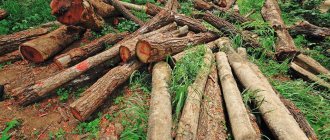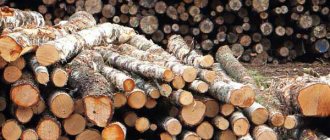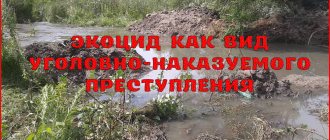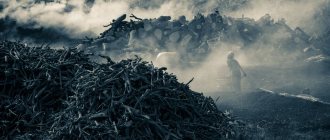ST 260 of the Criminal Code of the Russian Federation.
1. Illegal felling, as well as damage to the point of stopping the growth of forest plantations or trees, shrubs, and vines not classified as forest plantations, if these acts were committed on a significant scale, -
shall be punishable by a fine in the amount of up to five hundred thousand rubles, or in the amount of the wages or other income of the convicted person for a period of up to three years, or by compulsory labor for a term of up to four hundred eighty hours, or by corrective labor for a term of up to two years, or by forced labor for a term of up to two years. with a fine in the amount of one hundred thousand to two hundred thousand rubles or in the amount of wages or other income of the convicted person for a period of one year to eighteen months or without it, or imprisonment for a term of up to two years with a fine in the amount of one hundred thousand to two hundred thousand rubles or in the amount of wages or other income of the convicted person for a period from one year to eighteen months or without it.
2. Illegal logging, as well as damage to the point of stopping the growth of forest plantations or trees, shrubs, and vines not classified as forest plantations, if these acts are committed:
a) a group of persons;
b) has become invalid;
c) by a person using his official position;
d) on a large scale, -
shall be punishable by a fine in the amount of five hundred thousand to one million five hundred thousand rubles, or in the amount of the wages or other income of the convicted person for a period of three to four years, or by forced labor for a term of up to four years with a fine in the amount of one hundred fifty thousand to three hundred thousand rubles. or in the amount of wages or other income of the convicted person for a period of eighteen months to two years or without it and with or without deprivation of the right to hold certain positions or engage in certain activities for a term of up to three years, or with imprisonment for a term of up to four years with a fine in the amount of one hundred fifty thousand to three hundred thousand rubles or in the amount of wages or other income of the convicted person for a period of eighteen months to two years or without it and with or without deprivation of the right to hold certain positions or engage in certain activities for a period of up to three years.
3. Acts provided for in parts one or two of this article, committed on an especially large scale, by a group of persons by prior conspiracy or by an organized group, -
shall be punishable by a fine in the amount of one million to three million rubles, or in the amount of the wages or other income of the convicted person for a period of four to five years, or by forced labor for a term of up to five years with a fine in the amount of three hundred thousand to five hundred thousand rubles, or in the amount of wages or other income of the convicted person for a period of two to three years or without it and with deprivation of the right to hold certain positions or engage in certain activities for a term of up to three years or without it, or imprisonment for a term of up to seven years with a fine of three hundred thousand to five hundred thousand rubles or in the amount of wages or other income of the convicted person for a period of two to three years or without it and with or without deprivation of the right to hold certain positions or engage in certain activities for a period of up to three years.
Note
. In this article, significant damage is recognized as damage caused to forest plantations or trees, shrubs and vines not classified as forest plantations, calculated according to the rates and methodology approved by the Government of the Russian Federation, exceeding five thousand rubles, large size - fifty thousand rubles, especially large size - one hundred fifty thousand rubles.
Composition of the crime under the article
Items of illegal logging include trees, shrubs, and vines growing in forests. They cannot be fruit or berry bushes and trees that grow on agricultural lands, with the exception of those located on dacha and garden plots, unless otherwise provided by current regulations.
That is why cutting dead wood is not illegal, since dead wood itself is not defined as the subject of a crime under Art. 260 of the Criminal Code of the Russian Federation.
The objective side of the crime is expressed in illegal logging or damage to forest plantations and trees.
Reference. Within the meaning of the commented article, felling means not only the process of sawing and felling, but also any other method of separating a tree or shrub from the ground (uprooting, pulling out, etc.).
If any enterprise intends to use forests on forest fund lands, then for this it must be registered as a legal entity and have the appropriate documents.
Legal entities and individuals, as well as individual entrepreneurs, have the right to cut down trees or shrubs if they have forest lease agreements or forest purchase and sale agreements. In particular, the latter will be needed by those citizens who harvest wood for heating, construction or other needs.
The meaning of the comments to Art. 260 of the Criminal Code of the Russian Federation is that the subjective side of the offense is characterized by direct intent. This means that the citizen carrying out the logging is fully aware of the social danger of his act and understands that it will result in serious harm, and also wants the latter to occur.
The offense is considered completed when the tree or shrub has been completely separated from the ground or when it has been damaged to the point of stopping growth, provided that the result of the act was the infliction of serious harm.
The acts listed in Part 1 and Part 2 of Art. 260 of the Criminal Code of the Russian Federation, belong to the category of crimes of minor gravity, and those specified in Part 3 - to the category of moderate gravity. Art. 260 part 3 of the Criminal Code of the Russian Federation is subject to amnesty.
Objects and subjects of crime
The main object of the crime is public relations in the field of protection and rational use of forest plantations. They are regulated by the following legislation:
- Law on Environmental Protection;
- Forest Code of the Russian Federation (the main source that determines relations in the field of forest management in Russia);
- other legal acts of the Government of the Russian Federation, constituent entities of the Russian Federation and local governments, etc.
The subject of the act is a mentally healthy person who was 16 years old at the time of its commission. It could also be an official who gave orders for illegal deforestation.
Grounds for assigning liability
The most important reason is the infliction of significant damage as a result of the offense. To calculate it, the rates approved by the Decree of the Government of the Russian Federation No. 273 of 05/08/2007 are used, as well as the methodology given in the same document.
The essence of this technique is to assess economic and environmental damage. This takes into account how much forest was cut down, how it was done and under what circumstances.
Another mandatory basis is the establishment of a cause-and-effect relationship between two events: illegal deforestation and the occurrence of the damage itself.
Commentary to Art. 260 of the Criminal Code of the Russian Federation
The object of the crime is public relations in the field of protection and rational use of forests and non-forest trees and shrubs.
Relations regarding the use and protection of forest plantations are regulated by the Federal Law of January 10, 2002 N 7-FZ “On Environmental Protection”, the LC RF, legal acts of the Government of the Russian Federation, constituent entities of the Russian Federation and local governments adopted within their competence, and also civil and land legislation (Article 3, Art. 81 - 84 of the LC RF).
———————————
NW RF. 2002. N 2. Art. 133.
The subject of the crime in question is forest plantings, i.e. trees, shrubs and vines growing in forests (Article 16 LC), as well as trees, shrubs and vines not classified as such.
Forests are located on forest lands that are federally owned (Article 3 of Federal Law No. 201-FZ of December 4, 2006 “On the entry into force of the Forest Code of the Russian Federation”), and lands of other categories. The latter should include lands of transport, populated areas (settlements), lands of the water fund, etc.
The boundaries of forest fund lands and lands of other categories on which forests are located are determined in accordance with forestry, land legislation and legislation on urban planning.
Forest is a multifaceted concept. It is considered as a natural phenomenon in technical, economic, legal, medical, environmental and other aspects. The Forest Encyclopedia defines it as one of the main types of vegetation, consisting of a set of woody, shrubby, herbaceous and other plants (mosses, lichens), animals, microorganisms, biologically interconnected in their development and influencing each other and the external environment. At the same time, it is part of the biosphere, an element of the landscape, a raw material resource, and an object of forestry management.
———————————
Forest encyclopedia. T. 1. M., 1985. P. 503.
In Art. 5 of the RF LC “The Concept of Forest”, a forest is considered as an ecological system or as a natural resource. Taking this into account, trees and shrubs (fruit, berry, etc.) growing on agricultural lands, with the exception of forest protection plantings, on personal, dacha and garden plots, windfall and windbreak trees, still cannot be recognized as the subject of an environmental crime. etc., unless otherwise provided by special legal acts. Acts that are supposed to define the concept of trees, shrubs and vines that are not forest plantations have not yet been adopted.
The commented article establishes liability for the illegal cutting of trees, shrubs and vines in their natural state, including both those that have grown on their own and those planted by humans to replenish forest and non-forest plant funds. Therefore, the concept of “planting”, used in the LC RF and Art. 260 of the Criminal Code of the Russian Federation, does not fully express the subject of the crime.
Taking possession of those trees that have been cut down and prepared for storage, sale or removal by other persons is qualified as theft of property (clause 11 of the Resolution of the Plenum of the Supreme Court of the Russian Federation of November 5, 1998 No. 14).
———————————
Bulletin of the Supreme Court of the Russian Federation. 1999. N 1.
Felling for the purpose of taking possession of artificially grown fruit and ornamental trees and shrubs in tree nurseries, fruit nurseries and similar places is classified as theft, since here the trees and shrubs are products of commercial production, produced for sale and perform economic rather than environmental functions.
The cutting of protective and landscaping plantings not included in the state forest fund on lands of defense, transport, water resources and lands of other categories is classified as illegal cutting of forest plantations.
Based on the environmental, economic, ecological and social significance of forests located on forest fund lands, they are divided according to their intended purpose into protective, operational and reserve (Article 10 of the RF LC). Forests located on lands of other categories can be classified as protective.
Features of the use, protection, reproduction of forests of these categories and the content of forest categories are set out in Art. Art. 102 - 109 LC RF.
From the objective side, the crime consists of illegal logging, as well as damage to the point of stopping the growth of forest plantations and trees, shrubs, vines that are not classified as such, if these acts are committed on a significant scale.
The RF LC (Article 16) recognizes the felling of forest plantations as “the processes of sawing, felling, and cutting.” It appears that within the meaning of Art. 260 of the Criminal Code of the Russian Federation, any other method of separating a tree, bush, vine from the ground (uprooting, weeding, pulling out, breaking, etc.) should also be considered felling. Types of felling, as well as the legal characteristics of selective and clear cuttings are determined by Art. Art. 16, 17 LC RF.
The procedure for felling forest plantations is determined by the rules of timber harvesting, the rules of sanitary and fire safety in forests, and the rules of forest care (Part 3 of Article 16 of the RF LC).
The use of forests, which constitutes entrepreneurial activity, is carried out on forest lands by persons registered in the Russian Federation in accordance with Federal Law of August 8, 2001 N 129-FZ “On state registration of legal entities and individual entrepreneurs” (Part 3 of Art. 25 LK RF). To obtain the right to cut down forest plantations, the applicant must submit a forest declaration (application) on the use of forests in accordance with the development project. Its form, the procedure for filling out and submitting it are approved by the authorized federal executive body. The use of forests may be limited or suspended in cases provided for by the LC RF and other federal laws. The procedure for timber harvesting, which constitutes a business activity, the types of forests in which it is allowed, and the total volumes of timber unacceptable for felling are established by Art. 29 LK RF. The list of tree and shrub species for which timber harvesting is not permitted is established by the Government of the Russian Federation. At the same time, legal entities and citizens can harvest wood on the basis of lease agreements for forest plots, and in the case of logging without the provision of forest plots - on the basis of purchase and sale agreements for forest plantations.
The procedure for providing forest plots for use to citizens and legal entities is determined by Art. Art. 71 - 80 LC RF.
Wood harvesting by citizens for heating, construction and other personal needs is carried out on the basis of contracts for the sale and purchase of forest plantations (Article 30 of the RF LC). The procedure and standards for such procurement are established by the laws of the constituent entities of the Russian Federation.
Felling of plantations not carried out in accordance with the stated requirements is considered illegal.
Felling of the wrong tree species, not those specified in the document, before or after the deadlines specified in it, is recognized as illegal, even if there is a permit, but in violation of the conditions specified in it: , shrubs and vines prohibited from felling, or after a decision has been made to suspend, limit or terminate the activities of the forest user or the right to use the forest fund site.
A crime is considered completed from the moment a tree, bush or vine is completely separated from the root or from the moment it is damaged to the point of cessation of growth (death), if these acts are committed on a significant scale. It is mandatory to establish a causal link between illegal logging or damage to the subject of a crime and a significant amount of damage.
As follows from the note to the commented article, the size of the felling is identified with the damage caused to the forest fund and forests not included in the forest fund. In qualified (part 2 of the article under comment) and especially qualified (part 3 of this article) compositions, large and especially large sizes are also distinguished.
When determining significant, large, especially large felling sizes, it should be borne in mind that the Decree of the Government of the Russian Federation of May 8, 2007 N 273 “On calculating the amount of damage caused to forests due to violation of forest legislation” approved taxes for calculating the amount of damage caused to forest plantations or trees, shrubs and lianas not classified as forest plantations due to violation of forest legislation, the harvesting of which is permitted (Appendix No. 1), taxes for calculating the amount of damage caused by trees and shrubs, the harvesting of which is not permitted (Appendix No. 2), as well as methodology for calculating damage caused to forest plantations or trees, shrubs and vines not classified as forest plantations due to violation of forest legislation. At the same time, it seems that when determining the size of illegal logging, one should, in the same way as when determining damage due to illegal harvesting of aquatic animals and plants and illegal hunting, take into account not only economic damage, but also environmental damage.
———————————
NW RF. 2007. N 20. Art. 2437; RG. 2007. May 23.
See: Zhevlakov E. On calculating the amount of damage caused by illegal cutting of trees and bushes // Legality. 2002. N 10.
From the subjective side, the crime in question is committed with direct intent. The person carrying out the felling is aware of the social danger of his actions and foresees that they will cause the damage specified in Art. 260 damage, and desires the occurrence of these consequences. The motives for the crime do not matter for qualification.
The subject of the crime is a person using his official position (Part 2 of the commented article - a special subject), and any other person is a general subject. Responsibility for this crime begins at the age of sixteen.
In the qualified corpus delicti (parts 2 and 3 of the commented article), persons using their official position are understood as officials of state institutions, organizations (forestry enterprises, forestry management bodies, forest protection bodies, etc.), as well as and heads of economic entities of any form of ownership and their structural divisions who use the forest fund or carry out any work.
Officials or persons performing managerial functions in non-governmental organizations, on whose orders illegal cutting of forest plantations is carried out during logging, as well as when laying routes for pipelines, power lines, geological exploration, construction and other work, if there are signs of a crime, are liable only for Part 2 of the commented article. Qualifications according to Art. Art. 201 and 285 of the Criminal Code of the Russian Federation in their entirety are not required.
On the concepts of a group of persons, a group of persons by prior conspiracy, an organized group, see the commentary to Art. 35 of the Criminal Code of the Russian Federation.
Qualification criteria
If we talk about the signs of the offense specified in Part 1 of Art. 260 of the Criminal Code of the Russian Federation, they are as follows:
- the occurrence of significant damage;
- the illegality of the acts listed in this part.
The crime in Part 2 of Art. has other signs. 260 of the Criminal Code of the Russian Federation:
- commission of an act by a group of persons;
- the person’s use of his or her official position for this purpose (these may be officials of government agencies and heads of economic entities);
- causing major damage.
Accordingly, the qualifying signs of a crime under Part 3 of Art. 260 of the Criminal Code of the Russian Federation is:
- causing particularly large damage;
- by a group of people according to a pre-prepared plan.
Responsibility measures
Sentences under Art. 260 of the Criminal Code of the Russian Federation is issued in accordance with what part of the commented article the crime was classified under. If according to the first, then the following punishments are chosen:
- fine up to 500,000 rubles. or a citizen’s salary for 3 years;
- compulsory work for 480 hours;
- correctional labor for 2 years;
- forced labor for 2 years with payment of a fine from 100 to 200 thousand rubles. or salary for 1-1.5 years (the latter sanction is determined by the judge at his own discretion);
- imprisonment for the same period using the above optional sanction.
If an offense is determined under Part 2 of Art. 260 of the Criminal Code of the Russian Federation the following penalties are assigned to the criminal:
- payment of a fine in the amount of 500,000 to 1 million rubles. or salary for 3-4 years;
- forced labor for 4 years with payment of a fine in the amount of 150 to 300 thousand rubles. or salary for 1.5-2 years with a ban on engaging in certain types of activities in the field of logging for 3 years (sanctions are optional);
- imprisonment in a colony for a period of up to 4 years with the application of one of the two or both of the above sanctions.
When qualifying an act under Part 3 of Art. 260 of the Criminal Code of the Russian Federation, the court sentences offenders to the following types of punishment:
- payment of a fine in the amount of 1 to 3 million rubles. or salary for 4-5 years;
- forced labor for 5 years with payment of a fine in the amount of 300 to 500 thousand rubles. or salary for 2-3 years with a ban on the right to hold positions in the field of logging (the last two measures are chosen at the discretion of the judge);
- imprisonment in a colony for a period of up to 7 years with the application of one of the two or both of the above sanctions.
Illegal logging of forest plantations
1. Illegal felling, as well as damage to the point of stopping the growth of forest plantations or trees, shrubs, vines not classified as forest plantations, if these acts are committed in a significant amount, is
punishable by a fine in the amount of up to five hundred thousand rubles or in the amount of wages or other income of the convicted person for a period of up to three years, or compulsory labor for a term of up to four hundred eighty hours, or correctional labor for a term of up to two years, or forced labor for a term of up to two years with a fine in the amount of one hundred thousand to two hundred thousand rubles or in the amount of wages wages or other income of the convicted person for a period of one year to eighteen months or without it, or imprisonment for a term of up to two years with a fine in the amount of one hundred thousand to two hundred thousand rubles or in the amount of wages or other income of the convicted person for a period of one year up to eighteen months or without it.
2. Illegal logging, as well as damage to the point of stopping the growth of forest plantations or trees, shrubs, and vines not classified as forest plantations, if these acts are committed:
- a) a group of persons;
- b) has become invalid. — Federal Law of December 8, 2003 N 162-FZ;
- c) by a person using his official position;
- d) on a large scale, -
shall be punishable by a fine in the amount of five hundred thousand to one million five hundred thousand rubles, or in the amount of the wages or other income of the convicted person for a period of three to four years, or by forced labor for a term of up to four years with a fine in the amount of one hundred fifty thousand to three hundred thousand rubles. or in the amount of wages or other income of the convicted person for a period of eighteen months to two years or without it and with or without deprivation of the right to hold certain positions or engage in certain activities for a term of up to three years, or with imprisonment for a term of up to four years with a fine in the amount of one hundred fifty thousand to three hundred thousand rubles or in the amount of wages or other income of the convicted person for a period of eighteen months to two years or without it and with or without deprivation of the right to hold certain positions or engage in certain activities for a period of up to three years.
3. Acts provided for in parts one or two of this article, committed on an especially large scale, by a group of persons by prior conspiracy or by an organized group, -
shall be punishable by a fine in the amount of one million to three million rubles, or in the amount of the wages or other income of the convicted person for a period of four to five years, or by forced labor for a term of up to five years with a fine in the amount of three hundred thousand to five hundred thousand rubles, or in the amount of wages or other income of the convicted person for a period of two to three years or without it and with deprivation of the right to hold certain positions or engage in certain activities for a term of up to three years or without it, or imprisonment for a term of up to seven years with a fine of three hundred thousand to five hundred thousand rubles or in the amount of wages or other income of the convicted person for a period of two to three years or without it and with or without deprivation of the right to hold certain positions or engage in certain activities for a period of up to three years.
Note.
In this article, significant damage is recognized as damage caused to forest plantations or trees, shrubs and vines not classified as forest plantations, calculated according to the rates and methodology approved by the Government of the Russian Federation, exceeding five thousand rubles, large size - fifty thousand rubles, especially large size - one hundred fifty thousand rubles.
When liability does not apply
The Plenum of the Supreme Court on illegal logging of forest plantations on October 18, 2012 established that when considering such environmental crimes, the court must take into account all the circumstances of the incident, as well as all regulations related to it.
If we consider the judicial practice under Art. 260 of the Criminal Code of the Russian Federation, we can conclude that a citizen is often liable if he does not have permission to cut down forests or bushes or if the conditions specified in this document are violated.
Therefore, in order to avoid liability under the commented article, you must first obtain permission for yourself to carry out such actions. You must also strictly follow the terms and conditions specified in this document.
Publication source
The document was not published
Document Note
Document's name
Resolution of the Plenum of the Supreme Court of the Russian Federation dated October 18, 2012 N 21
“On the application by courts of legislation on liability for violations in the field of environmental protection and natural resource management”
PLENATURE OF THE SUPREME COURT OF THE RUSSIAN FEDERATION
RESOLUTION
dated October 18, 2012 N 21
ON THE APPLICATION OF LEGISLATION BY COURTS
ON LIABILITY FOR VIOLATIONS IN THE FIELD OF SECURITY
ENVIRONMENT AND NATURE MANAGEMENT
In connection with the issues that have arisen in the courts, and in order to ensure the unity of judicial practice in the application of legislation on liability for violations in the field of environmental protection and natural resource management, the Plenum of the Supreme Court of the Russian Federation, guided by Article 126 of the Constitution of the Russian Federation and Articles 9 of the Federal Constitutional Law dated 7 February 2011 No. 1-FKZ “On courts of general jurisdiction in the Russian Federation”, decides:
1. Draw the attention of the courts to the fact that guaranteed by Article 42 of the Constitution of the Russian Federation, everyone’s right to a favorable environment, reliable information about its condition and to compensation for damage caused to his health or property by an environmental offense, as well as the implementation of the provisions provided for in Part 1 of Article 9 , part 2 of article 36, article 58 of the Constitution of the Russian Federation, is ensured, inter alia, through the correct application of legislation on liability for violations in the field of environmental protection and natural resource management.
When considering cases of environmental violations, courts should be guided by the provisions of civil, administrative, criminal and other sectoral legislation, including the provisions of the Land, Forestry, Water Codes of the Russian Federation, Federal Law of January 10, 2002 No. 7-FZ “On Environmental Protection ", other laws and other regulatory legal acts of the Russian Federation and its constituent entities in the field of environmental protection and natural resource management.
The courts must find out which normative legal acts regulate the relevant environmental legal relations, and indicate in the court decision what their violations were directly expressed in, with reference to specific norms (clause, part, article).
If there is no such data in the indictment or indictment, which is not possible to fill in at a court hearing, the criminal case is subject to return to the prosecutor in accordance with Article 237 of the Code of Criminal Procedure of the Russian Federation in order to remove obstacles to its consideration by the court.
2. Causing harm to human health when committing crimes under Article 246, Part 2 of Article 247, Part 1 of Article 248, Part 2 of Article 250, Part 2 of Article 251, Parts 1 and 2 of Article 254 of the Criminal Code of the Russian Federation should be understood as causing harm to the health of any severity to one or more persons.
3. Persons using their official position to commit crimes provided for in Part 3 of Article 256, Part 2 of Article 258 and paragraph “c” of Part 2 of Article 260 of the Criminal Code of the Russian Federation should include both officials and civil servants and employees of local government bodies not classified as officials, as well as persons who permanently, temporarily or by special authority perform organizational, administrative or administrative functions in a commercial organization, regardless of the form of ownership, or in a non-profit organization that is not a state or municipal institution.
Explain that the use of official position is expressed not only in the deliberate use by the above-mentioned persons of their official powers, but also in exerting influence, based on the significance and authority of the position they occupy, on other persons for the purpose of committing illegal extraction (catch) of aquatic biological resources, hunting or felling of forest plantations.
Due to the fact that these norms specifically provide for liability for acts committed using one’s official position, the act is qualified only under Part 3 of Article 256, or Part 2 of Article 258, or paragraph “c” of Part 2 of Article 260 of the Criminal Code of the Russian Federation without being combined with crimes under Articles 201 or 285, 286 of the Criminal Code of the Russian Federation.
In cases where these persons commit other environmental crimes, they must be held accountable under the relevant articles of Chapter 26 of the Criminal Code of the Russian Federation, and if their actions contain signs of abuse of official powers or the powers of a person performing managerial functions in a commercial or other organization, or abuse of official powers the act is qualified in conjunction with the crimes provided for in Articles 201 or 285, 286 of the Criminal Code of the Russian Federation.
4. Based on the provisions of Part 2 of Article 24 of the Criminal Code of the Russian Federation, if the disposition of Article Chapter 26 of the Criminal Code of the Russian Federation does not specify the form of guilt, then the corresponding environmental crime can be committed intentionally or through negligence, provided that this is evidenced by the content of the act, the methods of its commission and other signs of the objective side of an environmental crime. For example, crimes provided for in Article 246, part 2 of Article 247, part 1 of Article 248, parts 1 and 2 of Article 250 of the Criminal Code of the Russian Federation can be committed either intentionally or through negligence, while crimes provided for in part 3 of Article 247 of the Criminal Code of the Russian Federation Part 2 of Article 248 of the Criminal Code of the Russian Federation, Part 3 of Article 250 of the Criminal Code of the Russian Federation, are committed only through negligence.
5. In relation to Article 246 of the Criminal Code of the Russian Federation, other grave consequences should be understood, in particular, as such deterioration in the quality of the environment and its components, the elimination of which requires a long time and large financial costs (for example, mass diseases or death of wildlife, including fish and other aquatic biological resources; destruction of conditions for their habitat and reproduction (loss of feeding grounds, spawning and wintering holes, disruption of migration routes, destruction of food supply); destruction of flora objects, resulting in a significant reduction in the number (biomass) of these objects; land degradation ). In this case, a mass death (disease) is considered to be an excess of the average statistical level of death (disease) of animals by three or more times.
Information provided
The documents provided are included in the ConsultantPlus System
| Attached file | Size |
| Appendix Resolution of the Plenum of the Supreme Court of the Russian Federation dated October 18, 2012 N 21 | 296 kb |







